
PCOS is the most common hormone imbalance impacting women and teenage girls. Polycystic ovarian syndrome, meaning “multiple ovarian cysts” can start soon after puberty and can persist for years. For some women it starts later – but for all women and teenage girls, it can be an incredibly frustrating, and sometimes painful condition.
WTF is PCOS?
Ovarian cysts occur when ovulation doesn’t occur as it is supposed to. In every cycle each ovary stimulates a number of follicles to develop, one of which will release an egg at ovulation. In PCOS the follicles are stimulated to grow (totally normal), but they do not respond to the hormonal cue to release an egg at ovulation. Instead they continue to grow and form cysts within the ovary.
There are many reasons why you may not respond appropriately to the hormones and instead form ovarian cysts – you can learn more about the types of PCOS in this article.
How Do I Know If I Have PCOS?
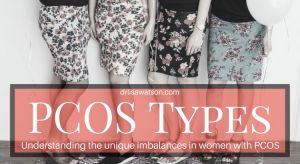 I talk about the diagnosis of PCOS in this article, but these are the most common symptoms that may suggest a diagnosis of PCOS:
I talk about the diagnosis of PCOS in this article, but these are the most common symptoms that may suggest a diagnosis of PCOS:
- Irregular or absent periods
- Infertility
- Hair growth on the upper lip or chin
- Hair loss from the head
- Acne – especially on the body or on the “beard distribution” of the face
- Weight gain or excess weight around the abdomen
If you have a family member with PCOS, you are more likely to develop it. So talk to your mom, sister, aunts and grandmothers to see if you have a family history.
If you suspect you may have PCOS, then discuss it with your MD or ND and get an appropriate diagnosis.
What Causes PCOS?
PCOS is the result of failed ovulations – so the cause can be anything that disrupts healthy ovulation. Hormone imbalances stemming from the pituitary gland, the thyroid, the adrenal glands or pancreas can all cause PCOS. Insulin resistance – when your cells no longer respond to the hormone insulin – is probably the most common hormone imbalance that leads to PCOS.
How is PCOS Treated?
In conventional care, PCOS is most often treated with the birth control pill. Other choices, like spironolactone or metformin, are also suggested if acne or insulin resistance are present. However, many women are successfully choosing a more empowered approach to treating their PCOS through diet, exercise and some health supporting supplements.
Diet and Lifestyle
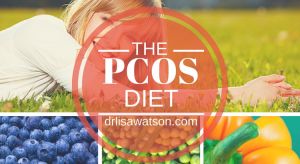 While not every woman with PCOS is overweight, if you are, losing weight is an important goal. Losing as little as 5% of your body weight can reverse insulin resistance, promote ovulation and decrease testosterone (less acne and chin/lip hair!)
While not every woman with PCOS is overweight, if you are, losing weight is an important goal. Losing as little as 5% of your body weight can reverse insulin resistance, promote ovulation and decrease testosterone (less acne and chin/lip hair!)
I go into great detail on the basics of the PCOS Diet in this article – also available as a fun infographic! Check it out for all the information you need.
Vitamins and Minerals
Many different supplements can be used for managing PCOS. These are best selected by working with your ND – knowing what your hormone imbalance is will allow you to choose those supplements most likely to work for you. Here are a few of the most helpful options:
Vitamin B6 – can help balance prolactin levels, a hormone often elevated in PCOS.
Chromium – essential for proper blood sugar regulation. Taking chromium (also known as insulin tolerance factor) increases the uptake of glucose into cells, decreasing insulin resistance.
Vitamin D – essential for healthy ovulation. Every Canadian is deficient during the winter months, and supplementation is often needed to correct that deficiency.
Herbal Medicines
Plant medicines can be incredibly powerful medicines, especially when it comes to supporting hormone balance. It depends on your type of PCOS what herbal medicines may be recommended.
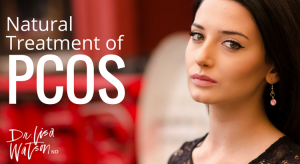 Saw palmetto (Serenoa repens) – an incredibly effective hormone balancer, saw palmetto decreases the conversion of testosterone to its more powerful form, dihydrotestosterone (DHT). This makes saw palmetto an excellent choice in the treatment of acne, hair loss, and facial hair growth.
Saw palmetto (Serenoa repens) – an incredibly effective hormone balancer, saw palmetto decreases the conversion of testosterone to its more powerful form, dihydrotestosterone (DHT). This makes saw palmetto an excellent choice in the treatment of acne, hair loss, and facial hair growth.
Chaste tree (Vitex agnus-castus) – one of the best known herbal medicines for PCOS, chaste tree lowers prolactin levels and raises progesterone levels. It can also restore regular ovulation, the main issue in PCOS!
Other Natural Supplements
A few honourable mentions are necessary in any discussion of PCOS – treatments that have excellent research and deserve to be considered in any woman seeking a more empowered approach to her PCOS.
Inositol – a B-like vitamin, inositol has many benefits for PCOS – it decreases insulin resistance, decreases testosterone levels and helps to promote regular ovulation. It is a super-star for PCOS treatment.
Berberine – compared in studies to metformin, berberine has powerful actions on blood sugar regulation and insulin resistance. It can reduce testosterone, and androgens. Women taking berberine also achieved greater weight loss in some studies.
Next Steps
Knowing that there are a great many different options for the treatment of PCOS, some women can feel overwhelmed by information. This is one of the many benefits of working with a Naturopathic Doctor. Your ND can help you understand your individual hormone imbalance and guide you to the treatments that will be most effective for you.
Remember, any hormone imbalance will take time to resolve. Start taking the steps now to achieve your healthy hormone balance.
Disclaimer
The advice provided in this article is for informational purposes only. It is meant to augment and not replace consultation with a licensed health care provider. Consultation with a Naturopathic Doctor or other primary care provider is recommended for anyone suffering from a health problem.



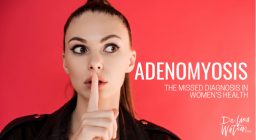






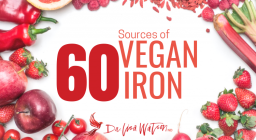

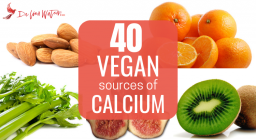
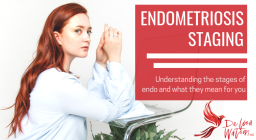



Touche. Outstanding arguments. Keep up the good work.
suffering from pcos ,hair growth on face ,pain in stomach guide me
Follow the dietary suggestions in this article – eat less refined grains, avoid sugar. Talk to a Naturopathic Doctor or other qualified health care provider to get help with blood sugar balance and hormone balancing. You can get better! ~Lisa
I’m looking for a naturopathic doctor in the Charlotte North Carolina area
Thank you for the better information than other sites! I was diagnosed at 19.
Can a woman take the saw palmetto cause everything says just for men
Yes. Women can take saw palmetto. In women it is used typically to treat hyperandrogenism – high levels of testosterone or dihydrotestosterone. It acts as a 5-alpha reductase inhibitor, supporting the natural balance in the body between estrogen and testosterone. I would suggest discussing this treatment option with your Naturopath to be sure it’s right for you.
~ Lisa
Thank you for reading! I’m happy to share good quality research and information to help you make informed, empowered decisions on your health!
~Lisa
You can find a qualified Naturopathic Doctor in your area by searching on the American Association of Naturopathic Physicians website at http://www.naturopathic.org/
~Lisa
[…] research studies. One specific antioxidant is showing promise in clinical studies of women with polycystic ovarian syndrome […]
I am so encouraged after reading your posts. ….tears streaming…. My youngest daughter has just been diagnosed and she is not feeling well at all with the nausea. I want to take her to a naturopathic physician and may even travel to Toronto!!!
Would you suggest taking both the saw palmetto and chaste berry together? I’ve been tested and have both very high testosterone levels and very low (post menopausal low levels at 29 years old, my estrogen is less than .01 percent) I hate taking prescriptions unless I have to. Thanks so much for the info btw!
Yes. I often recommend them together, but your best bet is to work with a naturopath who can tailor a plan directly to your needs. Sometimes you need to take the chaste berry at specific times of the month for optimal outcomes. And remember – the most important thing you can do for PCOS is to optimize your diet and move your body every day! ~Dr. Lisa
I am suffering pcos from last 6 years please help me my periodic cycle is after 2 or three month please recommend me some solution of my problem.hair loss on skull and access hair on face and acne problem
What do you recommend for pattern hair loss? I am trying to get pregnant so my dermotrologist didn’t recommend anything.
[…] out of PCOS’s nasty clutches. My surgery was 12 years ago, and I really have to work at my diet and exercise to stay ahead of the game. Even more now that I’m over 30 and have a job that is fairly […]
Always with hair loss I suggest understanding the root cause. You can read more about my approach here at https://drlisawatson.com/female-hair-loss
~Dr. Lisa
With PCOS most of the symptoms result from high testosterone levels. But you need to understand what the underlying cause is. Check your PCOS type with this article here – https://drlisawatson.com/pcos-types – and talk to your naturopath about the appropriate treatments for you.
~Dr. Lisa
My functional medicine MD, who is really awesome about supplements and natural alternatives, recommended that I use chromium yeast rather than chromium picolinate for my PCOS blood sugar issues. It has actually helped stabilize my blood sugar. I have less fluctuations and feel less tired and irritable. I even lost a good chunk of weight finally. What are your experiences with chromium yeast?
Generally you can use either chromium yeast or chromium picolinate with similar impacts. Some studies have found chromium picolinate better for building lean body mass during weight loss – but both are effective for blood sugar stability! ~Dr. Lisa